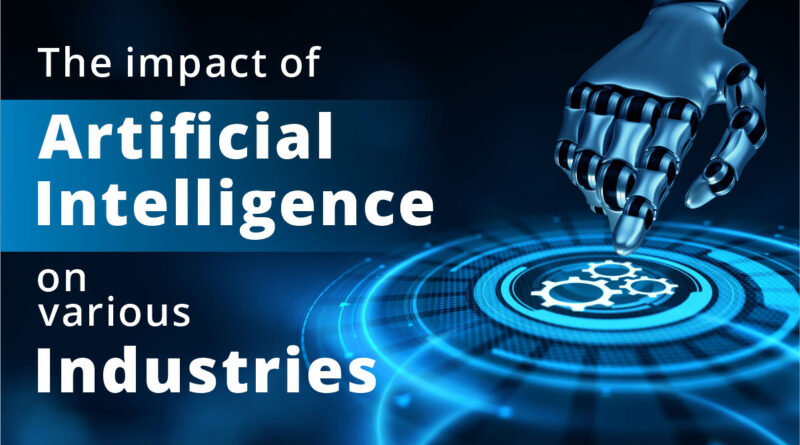IT Sector Growth: The Impact of AI and Automation
Introduction
The Information Technology (IT) sector has become one of the strongest and fastest-growing parts of the global economy. Over the past few years, technology has changed how people live, work, and communicate. But in recent times, two major forces — Artificial Intelligence (AI) and Automation — have completely transformed the way IT companies operate and grow.
From simple software tools to smart robots and data-driven decisions, AI and automation are reshaping the entire technology industry. In this article, we will explore how these technologies are helping the IT sector grow, what challenges they bring, and what the future may look like.
What Is AI and Automation?
Before we dive deep, let’s understand these two important terms in simple words.
Artificial Intelligence (AI)
AI is the ability of a computer or machine to think and learn like humans. It can make decisions, recognize speech, translate languages, and even predict outcomes. Common examples include chatbots, voice assistants like Siri and Alexa, and recommendation systems used by YouTube or Netflix.
Automation
Automation means using machines or software to do tasks that humans used to do manually. It can be simple — like automatic email replies — or complex, like robotic process automation (RPA) used by large companies to manage data and workflows.
Together, AI and automation are helping businesses become faster, smarter, and more efficient.
How AI and Automation Are Driving IT Sector Growth
1. Faster and Smarter Work Processes
AI tools can handle large amounts of data and perform tasks much faster than humans. For example, software testing, which used to take days, can now be done in hours using AI-powered tools. This helps IT companies deliver projects faster and with fewer mistakes.
Automation also saves time by taking care of repetitive tasks such as report generation, data entry, or system monitoring. As a result, human employees can focus on more creative and strategic work.
2. Cost Reduction and Higher Efficiency
When repetitive tasks are automated, companies save both time and money. Machines don’t need breaks, salaries, or holidays. This makes operations more cost-effective.
For example, automated customer support systems can handle thousands of queries daily without human help. This reduces the cost of hiring large teams and allows businesses to provide 24/7 service.
3. Better Decision-Making
AI systems can analyze millions of data points within seconds and find patterns that humans may not notice. This helps businesses make smarter decisions — such as predicting future sales, improving product design, or understanding customer needs.
Data-driven decisions lead to more accurate business strategies and stronger profits, making the IT sector more competitive.
4. Innovation and New Services
AI is not just about improving existing work — it’s also about creating new products and services. Many IT companies are now building smart software solutions that use AI for healthcare, education, cybersecurity, and finance.
For example:
-
In healthcare, AI helps detect diseases from medical images.
-
In education, it powers personalized learning apps.
-
In finance, it identifies fraud or risky transactions.
Each new application creates new job roles, new companies, and more opportunities — all contributing to IT sector growth.
5. Cloud Computing and AI Integration
The growth of cloud technology has made AI and automation tools more accessible. Small and medium-sized businesses can now use AI through cloud services like Amazon Web Services (AWS), Microsoft Azure, or Google Cloud.
This shift allows even smaller IT companies to use advanced technology without spending millions on hardware and servers.
6. Cybersecurity and AI
As technology grows, so do online threats. AI helps IT companies strengthen cybersecurity by detecting and preventing attacks automatically.
AI systems can analyze network traffic, identify unusual behavior, and stop attacks before they cause damage. This makes businesses safer and builds trust among users and clients.
Impact on Jobs in the IT Sector
One of the most discussed topics about AI and automation is their effect on jobs. While automation does replace some manual roles, it also creates new types of jobs.
Jobs That Are Changing
Repetitive and rule-based roles such as data entry, basic testing, or customer support are being automated. These tasks can be done faster and more accurately by machines.
New Job Opportunities
At the same time, new job categories are emerging:
-
AI Engineers and Data Scientists
-
Automation Specialists
-
Machine Learning Experts
-
Cybersecurity Analysts
-
Cloud Architects
These are high-demand, high-paying roles that require creative thinking, analysis, and technical skills.
The Need for Reskilling
As technology changes, IT professionals must keep learning. Reskilling — learning new skills — has become essential. Governments and companies worldwide are investing in training programs to help workers prepare for the future of AI and automation.
How Businesses Are Adapting
1. Digital Transformation
Every business today is trying to become digital. From banks to schools and hospitals, everyone is using software, websites, and mobile apps. IT companies that provide digital solutions are growing quickly as they help other industries modernize.
2. Smarter Customer Service
Many businesses now use AI chatbots and virtual assistants to talk to customers. These bots can answer simple questions, take orders, and even help solve problems instantly — all without human help.
3. Predictive Analytics
AI helps companies predict what might happen next — whether it’s customer behavior, product demand, or possible system failures. Predictive analytics allows companies to plan ahead and reduce losses.
4. Remote Work and Automation Tools
Since the COVID-19 pandemic, remote work has become common. Automation tools now help teams manage projects, track progress, and collaborate online. This trend has made IT services more flexible and global.
Challenges of AI and Automation in the IT Sector
Even though AI and automation bring many benefits, they also come with challenges that the industry must handle carefully.
1. Job Displacement
Some workers may lose their jobs if they cannot adapt to new technologies. It’s important for companies to provide learning opportunities so employees can upgrade their skills.
2. Data Privacy and Security
AI systems depend on large amounts of data. If this data is not protected, it can lead to security risks. Companies must follow strong data privacy laws and protect user information.
3. High Setup Costs
Developing AI systems or automation software can be expensive in the beginning. Smaller businesses may struggle with the initial investment, though it usually pays off later.
4. Ethical and Bias Issues
AI systems sometimes make unfair decisions if the data they learn from is biased. Developers must test and monitor these systems carefully to ensure fairness.
5. Continuous Learning Required
Because technology changes so quickly, IT professionals must keep learning new tools and methods. Without continuous training, it’s easy to fall behind.
The Future of IT with AI and Automation
The future of the IT industry looks very promising. AI and automation are expected to power almost every digital system in the coming years.
1. Smarter Software Development
AI tools will help programmers write code faster and fix bugs automatically. This will make software development quicker and cheaper.
2. AI in Everyday Life
From self-driving cars to smart homes, AI will continue to enter our daily lives. IT companies will play a major role in developing these technologies.
3. Global Collaboration
Automation tools make it easy for people from different countries to work together in real time. This will make the IT industry even more global and connected.
4. Growth in AI Startups
Thousands of new startups are emerging around the world with AI-based products. This innovation wave will create jobs, improve services, and boost economies.
5. Human + Machine Collaboration
The future is not about humans versus machines — it’s about humans working with machines. AI will handle repetitive work, while humans focus on creativity, decision-making, and emotional intelligence.
Conclusion
AI and automation are transforming the IT sector at a speed never seen before. They are making work faster, more accurate, and more innovative. While some jobs are changing, new opportunities are being created that demand higher skills and creativity.
The companies that adapt to these changes, invest in their people, and focus on ethical, secure AI systems will lead the future of technology.
In simple words — AI and automation are not replacing humans; they are helping us work smarter. The IT sector is entering a new era of innovation, and those who keep learning will continue to grow with it.

